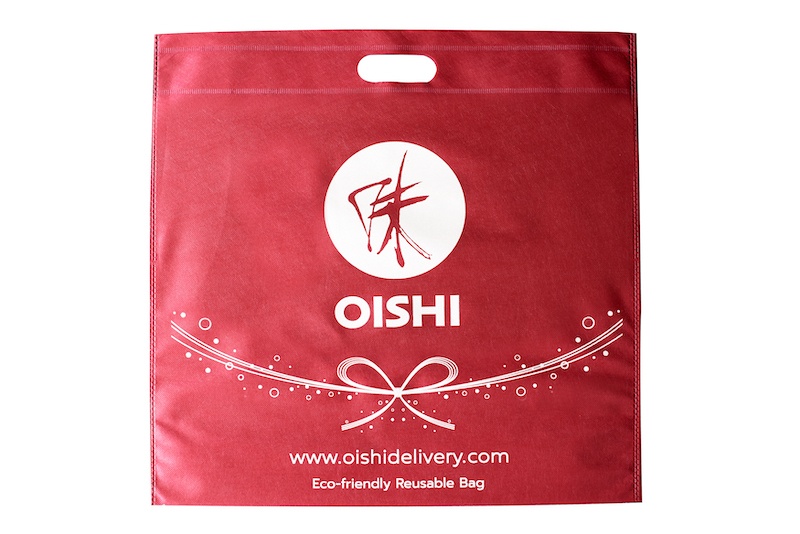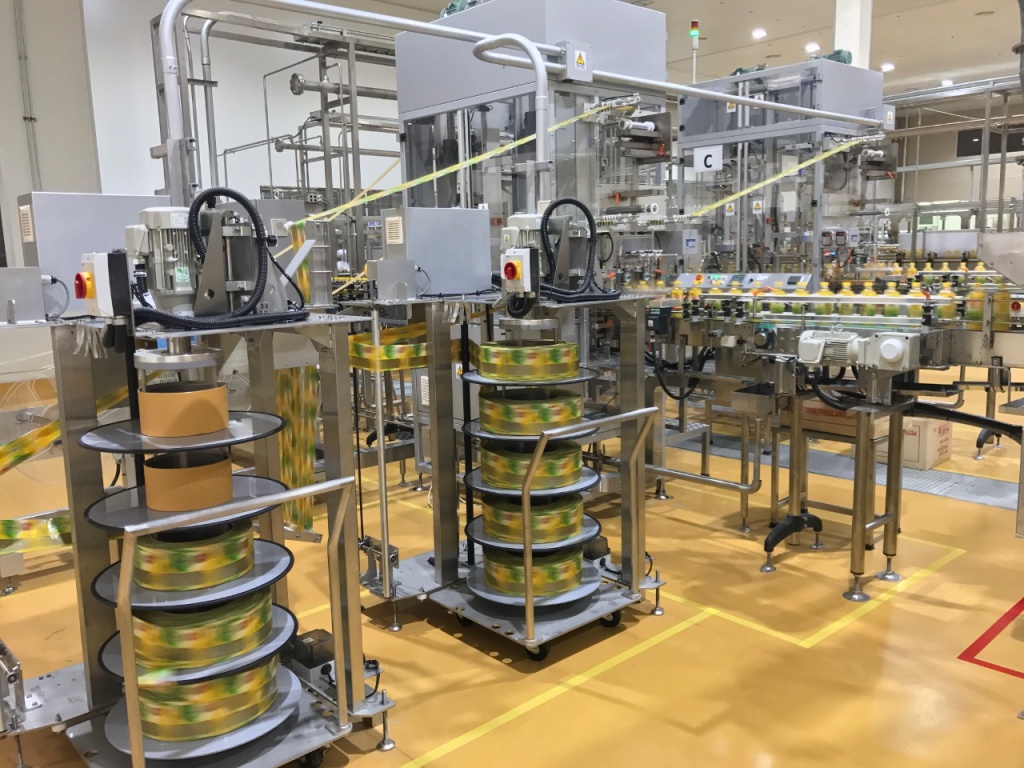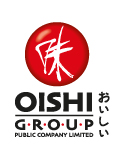Waste and Packaging Management
OISHI has supported the Sustainable Development Goals (SDGs) Goal 12: sustainable consumption and production plan and encourage recycling and reduction of solid waste in businesses, processes and consumers to meet sustainable waste disposal goals of ThaiBev in its efforts towards making food waste dumped into landfills become zero or ‘Zero waste to landfill’ by 2030. OISHI has formulated a strategic framework for sustainable waste management, which are reducing, controlling and utilizing food waste under sustainability actions aimed at reducing, controlling and utilizing food waste.
(1) Waste Management
The company has jointly driven the Sustainable Development Goals through various waste management projects and activities as follows:
- “Raks Arhaan” (Food Rescue Project)
Operation: OISHI joins in supporting the “Raks Arhaan” (Food Rescue) project of the Scholars of Sustenance (SOS Thailand), a food rescue foundation, by using leftover food that can be eaten or cooked, such as meat, seafood, crab sticks, pork balls, vegetables, fruits and fried foods from 3 OISHI restaurants, consisting of SHABUSHI Shop, Central Ladprao Branch; SHABUSHI Shop, Samyan Mitrtown Branch; and OISHI EATERIUM, Samyan Mitrtown Branch, in order to pass on food that is still of good quality and safety to the foundation, so that the foundation can continue to help other communities. OISHI's Quality Assurance (QA) Department has also established a method for storing food for such donations to maintain quality, and provide training and knowledge to employees of each branch participating in the project.
Result: OISHI has been supporting the food rescue project since the end of 2020 and is preparing to expand support to other branches in the future. The amount of food donated from Dec. 2020 - Aug. 2021 totaled 553.44 kilograms, or equal to 2,198 meals valued at 51,840.90 baht.
- #Kin Mod Klieng (Eat Up) Challenge
Operation: Oishi organizes the #Kin Mod Klieng Challenge campaign through SHABUSHI restaurants, totaling 156 branches nationwide, with the objective of campaigning for consumers to help reduce food waste, which is an environmental problem, and also helps reduce costs for the shop as well. The activity format is that the restaurant will invite customers to join the campaign in which customers can eat unlimited quantities as before, but have to eat them all. Hence they are considered the winners of the campaign. The winner will be rewarded with a 50 baht discount coupon for using the service next time.
Result: There are approximately 140,000 customers who come to use the service from April to September 2021 and have joined the program to help reduce food waste.
- Recycling Old Vegetable Oil from Cooking
Operation: The company sells old vegetable oils obtained from cooking at OISHI restaurants and from OISHI Food Service plants to contracted companies that are certified and are effective in handling used oils, then, which will be taken into the recycling process into biodiesel or animal feed, etc. All recycled oil will be used properly for its intended purpose in order to comply with legal requirements and corporate purposes.
Result: This project can transfer approximately 157,176 kilograms of old vegetable oil that has been used since October 2020 – September 2021 into the recycling process that can be converted to other uses. In addition, selling old vegetable oil to firm that meets standards can also generate income of 2,210,560 baht to the company.
- Soil Amendment
Operation: OISHI Food Service Factory (Central Kitchen) fermented vegetable waste leftovers from the production process in a natural way until the soil amendment is obtained to be used to nourish the trees within the factory area and donated to Ban Nong Chak School, which is located in the area near the central kitchen of OISHI, to be used to nourish the vegetable plot that was planted for lunch.
Result: Bring vegetable scraps from October 2020 to September 2021, total amount 6,476 kilograms, to make soil amendments. This is a valuable use of unused food resources and a reduction in waste disposal costs for the factory.
- The Use of Tea Waste
Operation: OISHI Beverage Factory can supply the tea waste to accredited contracting companies and has an efficient management of the tea waste and its utilization.
Result: OISHI Beverage Factory, Wang Muang District, Saraburi Province Forwarding 1,945,765 kilograms of tea waste to the contracting company to make fuel, while the OISHI Beverage Factory in Nava Nakorn Industrial Area, Pathum Thani Province, forwarded 1,855,988 kilograms of tea waste to the contracting company to be used as a soil conditioner.
(2) Packaging Management
Nowadays, the choice of packaging is not only for external beauty but also environmental impact. In the selection of packaging materials OISHI places importance on reducing resource consumption and using environmentally friendly materials. The company also takes into account the reuse or recycle of packaging materials after consumption in every business group such as:
Food Business : OISHI restaurant and OISHI EATO ready-to-cook and ready-to-eat food improve the use of packaging by following the four dimensions of packaging sustainability guidelines, which are:
- Use packaging that made from plastic that can bring back into the recycle process
- Reduce plastic use through packaging design.
- Use packaging made from biodegradable materials.
- Use packaging that customers can reuse.
As a result of these improvements, the new packaging operations in 2021 of OISHI Group's restaurants and OISHI EATO ready-to-cook and ready-to-eat food products can achieve 100% of the goal, and from such guidelines, OISHI restaurants can reduce the use of plastic by 3.46 tons from the following actions:

- Start using packaging that can be recycled, such as cloth bags, with the ‘Recycle’ symbol on the packaging to communicate to consumers who can use it to know information.
- Use innovative packaging that is biodegradable (Polylactic Acid (PLA)) such as ice cream cups, mugs, lids, straws and spoons from OYOKI restaurants.
- Study on using paper straws to replace plastic straws as an alternative in case of law enforcement in 2022.
As for ready-to-cook and ready-to-eat food products, OISHI EATO adheres to sustainable packaging practices to reduce plastic consumption through the following actions:
- Reducing the layer thickness of packaging film of OISHI EATO ready-to-cook and ready-to-eat foods. The frozen ramen line can reduce the thickness of the LLDPE film layer by 100%.
- The packaging of OISHI EATO refrigerated sandwich group uses a single plastic film (Mono-material) to be able to be decomposed without having to go through the film separation process. It helps reduce the process and energy consumption in film separation.
Beverage Business : In addition to striving to develop quality green tea beverages, OISHI continues to develop environmentally friendly packaging, especially to reduce the amount of plastic by doing the following:
- Reducing the weight of the preform : Plastic bottles are the main packaging of OISHI green tea, with preforms as raw materials for blow molding, divided into 2 sizes: (1) Preform weight 17 grams, used to blow plastic bottles of 350 ml. and 380 ml. (2) Preform weighing 18.5 grams, used to blow a 500 ml plastic bottle. Each year, OISHI uses more than 567 million preforms per year. It consists of preforms weighing 17 grams, approximately 317 million pieces per year, or approximately 55%, and preforms weighing 18.5 grams, approximately 188 million pieces per year, or approximately 33% of the total volume of preforms. Therefore, preform weight reduction is an alternative to plastic reduction.
In 2021, OISHI estimates the order amount of preforms weighing 17 grams, up to 317,280,000 pieces. OISHI began a trial project to reduce the preform weight from 17 g to 15.89 g for 350 ml and 380 ml bottles and from 18.50 g to 18.16 g for 500 ml bottles. And if the trial to reduce the preform weight to 15.89 grams is successful, it will reduce the production cost by 60,280,000 baht. But due to the higher price of plastic in the world market, the production costs in the 4th quarter of 2021 can reduce by 12,690,000 baht. In terms of environmental outcomes, a 17g preform would result in approximately 5.4 million kilograms of plastic used, which compared to 15.89 grams of preforms would reduce the plastic usage by approximately 352,000 kilograms. It is expected that the 15.89-gram preform trial project will be completed by the first quarter of 2022.
- Develop labels from PET materials : In 2021, OISHI has studied and experimented with PET labels in the CAF1 production line for OISHI Green Tea Genmai Flavor, 500 ml, instead of labels made from PVC plastic. This is because PET plastic has a more environmentally friendly production process than PVC and PET plastic can also be recycled. But in terms of use, PET plastic has limitations because of its high shrinkage, suitable for curved bottles with different sizes between the body and the neck of the bottle. Therefore, OISHI waits for accurate results of studies and experiments before applying them in the future.

- Replace the purple OISHI Green Tea Kyoho Grape Flavor bottle with a clear bottle : In early 2020, OISHI began to modify the packaging of its OISHI Green Tea Kyoho Grape Flavor by changing from colored PET bottles to clear PET bottles to be able to be recycled. Since the beginning of the operation, it is estimated that the amount of PET bottles that can be recycled can be increased by approximately 69 million bottles. It also reduces costs from the purple filling process in the bottle production process by up to 1.7 million baht per year.


